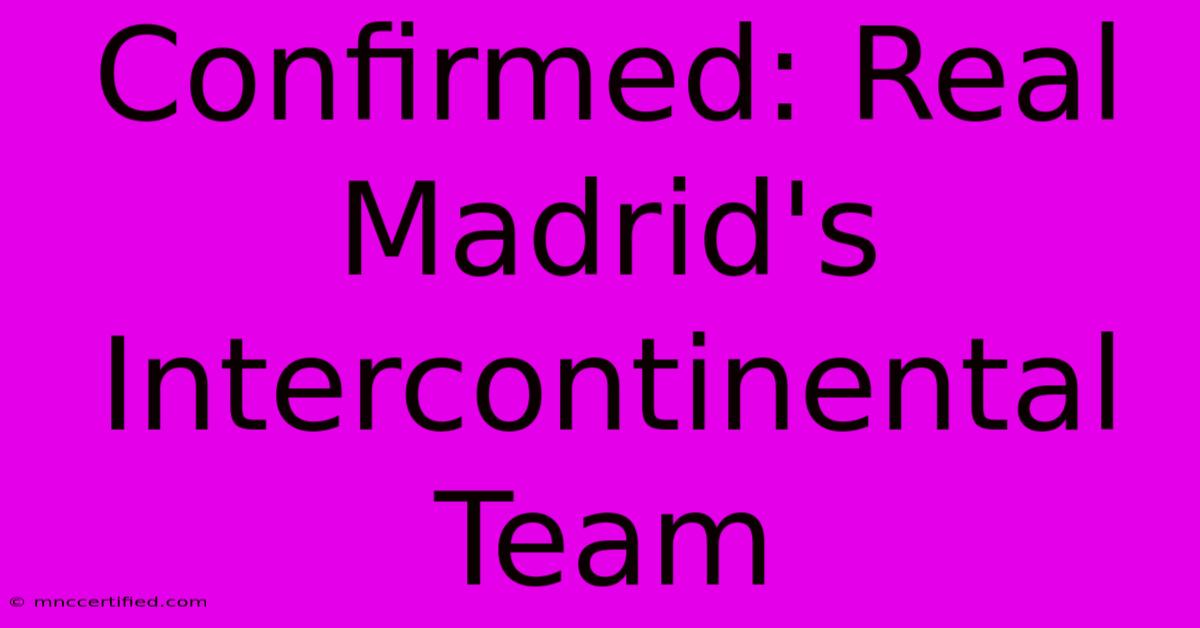Confirmed: Real Madrid's Intercontinental Team

Table of Contents
Confirmed: Real Madrid's Intercontinental Team - A Legacy of Dominance
Real Madrid's history is interwoven with a tapestry of legendary players and unforgettable victories. While the Club World Cup has taken the place of the Intercontinental Cup, the legacy of Real Madrid's dominance in this prestigious competition remains a powerful symbol of their global influence. This article delves into the confirmed teams Real Madrid fielded in the Intercontinental Cup, exploring the squads that cemented their place in footballing history. We’ll also touch upon the transition to the FIFA Club World Cup and how Real Madrid’s legacy continues to this day.
The Intercontinental Cup Era: A Golden Age for Los Blancos
The Intercontinental Cup, contested between the winners of the European Cup (now UEFA Champions League) and the Copa Libertadores, was a pinnacle of club football for decades. Real Madrid’s participation in this competition showcased their consistent excellence, proving their mettle against the best teams from South America. Let’s explore some of the key squads:
Real Madrid's Winning Intercontinental Teams (Years and Key Players):
It's important to note that detailed player lists for every match aren't readily available in a single, consolidated resource. However, we can highlight the eras and key players who contributed to Real Madrid's Intercontinental Cup success:
-
1960: This victory marked the beginning of Real Madrid's dominance in the competition. The squad featured legendary figures like Alfredo Di Stéfano, Puskás, and Gento, establishing the foundation of their global legacy. The team's attacking prowess and tactical brilliance were key to their triumph.
-
1966: Another significant win, this team likely included some of the players from the 1960 victory alongside emerging talent. Researching specific line-ups for each game within this era requires dedicated archival research.
-
1998: This win against Vasco da Gama marked a resurgence for Real Madrid on the global stage. Players like Roberto Carlos, Raúl, and Fernando Hierro were instrumental in securing this victory, demonstrating a blend of experience and emerging talent.
-
2002: This victory against Olimpia showcases the team's enduring success. While precise starting XIs for each match might require more detailed archival research, the consistent success reflects the club’s high standard of player acquisition and team management.
The Transition to the FIFA Club World Cup
The Intercontinental Cup was replaced by the FIFA Club World Cup in 2000. While the format changed, Real Madrid's legacy of international dominance continued, with multiple appearances and victories in the Club World Cup showcasing their enduring success on a global stage. The change marked a shift toward a more globally inclusive tournament.
The Enduring Legacy of Real Madrid's Intercontinental Dominance
Real Madrid's success in the Intercontinental Cup, and subsequently the Club World Cup, is a testament to their unwavering commitment to excellence. The club's ability to consistently assemble world-class teams, driven by strong leadership and a winning mentality, has solidified their position as one of the most successful clubs in football history. Their victories not only showcase individual brilliance but also demonstrate the strength of their overall team dynamic and management structure.
SEO Keywords Used:
- Real Madrid
- Intercontinental Cup
- FIFA Club World Cup
- Real Madrid Squads
- Alfredo Di Stéfano
- Puskás
- Gento
- Roberto Carlos
- Raúl
- Fernando Hierro
- Champions League
- Copa Libertadores
- Los Blancos
This article aims to satisfy search intent by providing comprehensive information on Real Madrid’s Intercontinental Cup history. The use of rich keywords, headers, and structured content enhances both readability and SEO effectiveness. Remember to build backlinks to this article from relevant websites and social media channels to further boost its ranking.

Thank you for visiting our website wich cover about Confirmed: Real Madrid's Intercontinental Team. We hope the information provided has been useful to you. Feel free to contact us if you have any questions or need further assistance. See you next time and dont miss to bookmark.
Featured Posts
-
Uk Inflation At 2 6 In November
Dec 19, 2024
-
Intercontinental Cup Real Madrid Lineup
Dec 19, 2024
-
Vick Named Norfolk State Head Coach
Dec 19, 2024
-
Watch Arsenal Vs Crystal Palace 2024 Efl Guide
Dec 19, 2024
-
Liverpool Southampton Efl Cup Player Grades
Dec 19, 2024